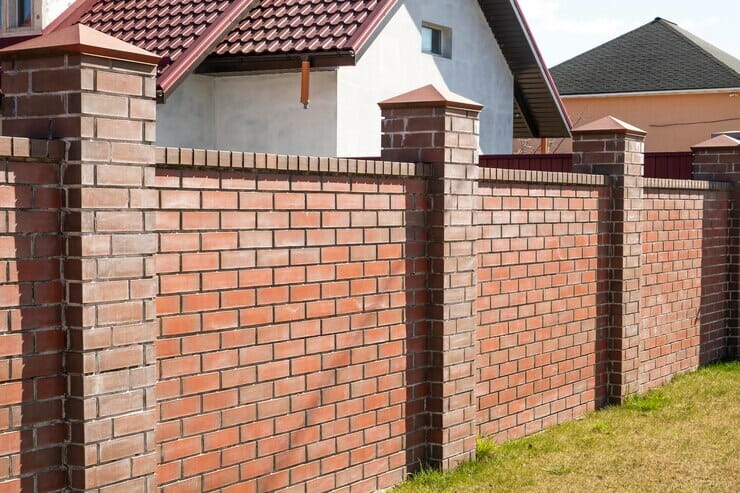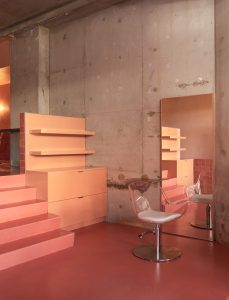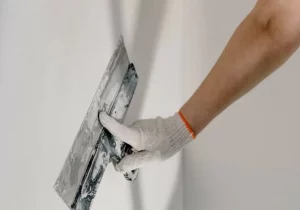The selection of the correct fence for your home can be a task. However, it is crucial because it impacts not only how it looks but also the safety and privacy of your property. There are various options available for fences, each having advantages and disadvantages of its own. Let’s examine each potential types of fences for home, to assist you in making a well-informed choice. Whether it’s the enduring charm of a picket fence, the toughness of a wooden fence, the attractiveness of vinyl’s low maintenance, or the safety of a chain-link fence.
Learn more about fences as we explore them below to make sure the one you select perfectly satisfies your needs, your home’s specifications, and your preferences.
11 Types of Fences for Home
1. Brick Wall Fence

A brick wall fence should be built on a sturdy base to keep it maintenance-free. Additionally, it works well for soundproofing and reducing noise in yards or buildings.
Here’s how to DIY a brick wall fence:
- Lay a strong foundation of concrete footings before installing the brick for the fence.
- Keep in mind level alignment and strong adhesion while using mortar for arranging the bricks.
- For an increased tensile strength, add reinforcing rods.
- To create a brick wall fence that will last and look good, maintain the thickness of the mortar.
Pro tip: Always choose a proper length of studding and, after drilling the holes, blow air to clear the dust before pouring in the epoxy glue.
PROS
- Offers significant security and privacy.
- Excellent durability and lifespan.
- Low maintenance.
- Weather and pest resistance.
CONS
- Expensive initial installation.
- Requires professionals for construction and repair.
- Limited design flexibility compared to other materials.
2. Stone Wall with Iron Fence

A clever design that gives the impression of a fort, is a stone wall with an iron fence. It is visually appealing, strong, and eco-friendly. However it resembles a precast stone wall and is the best type of fence for backyard.
According to the experts, to seamlessly integrate the stone wall with an iron fence, select a stone kind that blends well with the pattern and color of the iron.
Consider matching the heights of the iron fence and the stone wall to enhance the aesthetics.
Pro tip: To smooth the transition and create a harmonious and alluring barrier, add plants to the base.
PROS
- Enhances privacy while maintaining a semi-transparent aspect.
- Innovatively blends industrial and natural aesthetics.
- Weather resistant.
- Customizable designs, patterns, and colours.
CONS
- Time-consuming installation.
- High initial outlay of funds.
- Iron components may rust over time.
3. Precast Concrete Fence

Concrete fences are incredibly robust and long-lasting. They outperform all other types of fences for homes due to their resistance to the elements and debris. However Precast concrete fencing is just as resilient as thick bricks or concrete walls.
PROS
- Very durable.
- Has versatile design options, including textures and colours.
- Low maintenance
- Resistant to weather and pests.
- Provides a high level of privacy and security.
CONS
- Initial cost can be relatively high.
- Requires proper installation for stability.
4. Wood Fence

A wood fence has an enduringly classic look. Privacy, picket, and rail designs are the types of wood fences. Other options include redwood, pine, and hem/fir. However, cedar is the most popular types of fences for yards as it is rot-resistant. It’s the best types of fences for home.
PROS
- Provides an aesthetic that is cozy and natural.
- A variety of styles and designs are available.
- Easy installation for some models for do-it-yourselfers.
- Simple to alter, paint, or stain.
CONS
- Susceptible to deterioration and weathering over time.
- Require routine care, such as staining and sealing.
- May not offer the maximum level of security.
5. Chain-Linked Fence

Chain-link fencing is one of the strongest, long-lasting fencing materials available and is made of interlocking coated steel wire. However it is the best types of fences for the backyard.
To maximize functionality consider the following points:
- To increase rust resistance, use a galvanized or vinyl-coated alternative.
- Based on your security requirements, choose a gauge thickness; thicker gauges give more strength.
- To avoid sagging, make sure the installation is properly tensioned.
- To increase privacy, attach slats or growing climbers.
PROS
- Economical and budget-friendly choice.
- Low maintenance as it doesn’t need painting or staining.
- Provides visibility while also offering a certain amount of security.
- Installation is quick and simple.
CONS
- It might not be the greatest option for homes with architectural characteristics that demand a more aesthetic fence.
6. Barbed Wire Fence

A barbed wire fence offers a distinct rustic charm to any landscape. Its weathered appearance blends seamlessly with rural surroundings, evoking a timeless aesthetic.
To enhance longevity, regularly inspect the wire for signs of corrosion and promptly replace any compromised sections. To maintain effectiveness, ensure the wire is properly stretched.
Pro tip: To prevent climbing, install the fence at a minimum height of 4 to 5 feet.
PROS
- Effective shield against intruders and animals.
- Low maintenance.
- Relatively low cost.
CONS
- Has a rough appearance.
- Safety issues, particularly if installed incorrectly.
- Not recommended for families with kids or pets.
7. Uncut Boulders Fence

Uncut rock fencing provides a distinctive and natural fence option.
Follow these instructions to use uncut rocks to build a secure and beautiful fence:
- Make a strategy for the arrangement, making sure the boulders are positioned with stability in mind.
- Make sure the trenches you dig for each boulder are deep enough to serve as a stable base.
- Place the rocks in the trenches, adjusting their placement for a level and visually acceptable alignment.
- To hold the stones in place, backfill the trenches with gravel or concrete.
Pro tip: For a more natural appearanced, leave spaces between the rocks; otherwise, fill them with smaller stones or cement.
PROS
- Natural and rustic look.
- Excellent resistance to weather and wear.
- Requires minimum maintenance.
CONS
- Limited supply and expensive transportation.
- Time-consuming installation.
- May not offer complete security or privacy.
8. Aluminium Fence

This Aluminium fences offer the maximum amount of security as,
- It is difficult to climb on.
- Impossible to cut through.
- Their spear pickets help avoid trespassers and animals.
Aluminium fencing is one of the least susceptible alternatives, yet the danger of corrosion on a metal fence depends just as much on the finish material as it does on the underlying material.
PROS
- Wide variety of styles and coatings are available.
- Rust and corrosion-resistant.
- Lightweight and easy to install.
- Low maintenance.
CONS
- Less durable than other materials.
- Might not provide the greatest degree of security.
9. Vinyl Fence or PVC Fence

Vinyl fencing is a versatile alternative to traditional wood or metal options. Its synthetic composition helps in resisting rot, corrosion, and weathering, which in turn requires minimal maintenance over the years.
This low-maintenance attribute saves you time and money, as it doesn’t demand regular painting, sealing, or rust treatment. Vinyl fencing offers an array of styles and colours that mimic wood grains and metal finishes, granting you the freedom to achieve the desired aesthetics. Unlike wood, vinyl doesn’t splinter or warp, ensuring a smooth and safe surface.
PROS
- Easy to maintain, with no need for painting or staining.
- Resistant to decay, insects, and weathering.
- Available in various styles and colours.
CONS
- Initial pricing may be higher.
- Less durable than wood or metal and more susceptible to damage from impacts.
10. Bamboo Fence

A bamboo fence is a fence constructed by vertically installing bamboo in a line. It is also referred to as bamboo screening. After that it provides a means of maintaining privacy around the backyard, pool, or hot tub. The fence is extremely simple to construct and has an appealing look.
Pro tip: Make shallow ditches for the bamboo poles and pack the soil tightly around them to increase stability.
PROS
- Visually appealing and versatile.
- Bamboo is a sustainable material choice due to its quick growth.
- Provides privacy while allowing airflow.
CONS
- Might not offer the highest degree of security.
- Requires regular maintenance to prevent weathering.
- If not effectively maintained, it is prone to insect damage.
11. Living Fence

A living fence is a fence made up of trees or bushes. It goes by other names like a hedge or “green” fence.
PROS
- Eco-friendly and aesthetically pleasing
- Provides habitat for birds and insects.
- It lessens noise and helps to enhance air quality.
CONS
- It doesn’t offer the same level of security as other types of house fences.
- Regular maintenance and pruning are necessary.
Key Considerations for Selecting the Right Fence
Aesthetics, security, privacy, and upkeep are vital considerations to take into account while selecting the ideal fence for your house.
In conclusion each type of fence has benefits and drawbacks. Similarly there are several alternatives to choose from, ranging from the timeless beauty of brick walls to the nature of living barriers.
To ensure that your selected fence not only enhances your property but also satisfies your needs, it is essential to examine the benefits and drawbacks of various types of fence for your home.
Whether you value durability, beauty, or sustainability, therefore is a styles of fencing for you that can help you build a beautiful and practical living environment that is personalized to your needs.
FAQs on Types of Fences for Home
1. What is the best fence for a home?
The best option for a house relies on variables such as the desired level of security, privacy needs, aesthetic choices, and financial constraints. Before selecting a choice, it is essential to weigh the advantages of each type of fence against your demands.
2. Which fence style is often more economical?
Fences made of vinyl or metal are often more costly than those made of wood. Pine fences are often cheaper than rot-resistant woods like cedar among the wood choices available today.
3. What kind of fencing needs the least maintenance?
Unlike other materials, vinyl fence is renowned for requiring less upkeep. While still giving toughness and endurance, it offers an easy-to-care-for alternative.
4. How can I keep my fence looking good?
Make any necessary repairs after regularly inspecting your fence for wear and tear or damage. The fence enhances the beauty of the home with regular cleaning and upkeep, such as painting or staining, which makes it endure longer and seem more attractive.
5. What can I do to make my fence more secure?
Consider including elements like locks, electronic access controls, or security cameras in the design of your fence for increased security. Potential burglars can be discouraged by selecting a fence with few gaps and robust materials, such as metal or composite.
Explore Further:-
- Things to Know Before Installing The Fence
- 13 Irresistible Fence Gate Design To Transform Your Outdoor Space
- 6 Fascinating Ideas For Decorating Garden Fence
- A Beginners Guide To Fences
- Horizontal Vs Vertical Fences: Which Is Right for Your Home?



